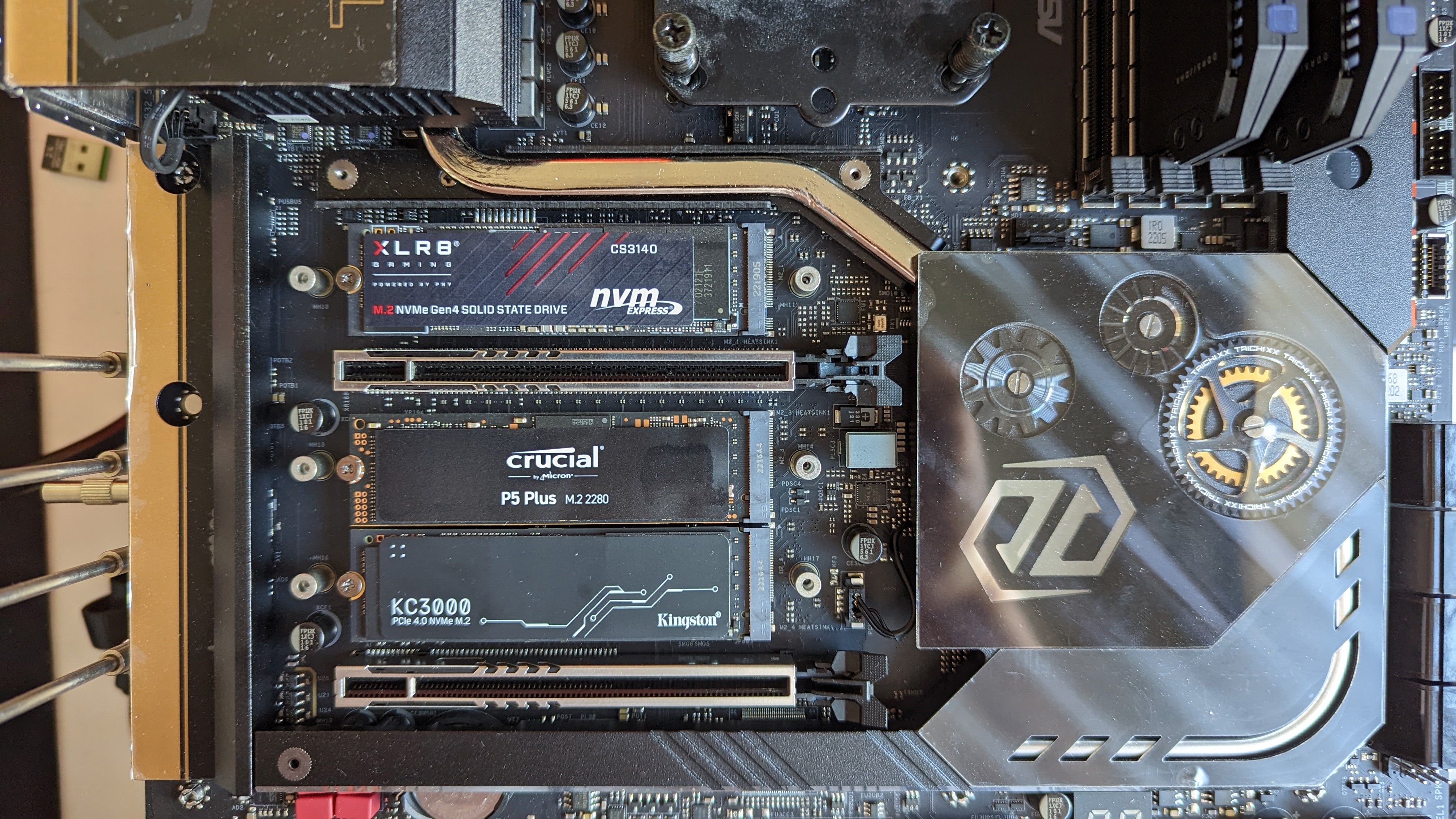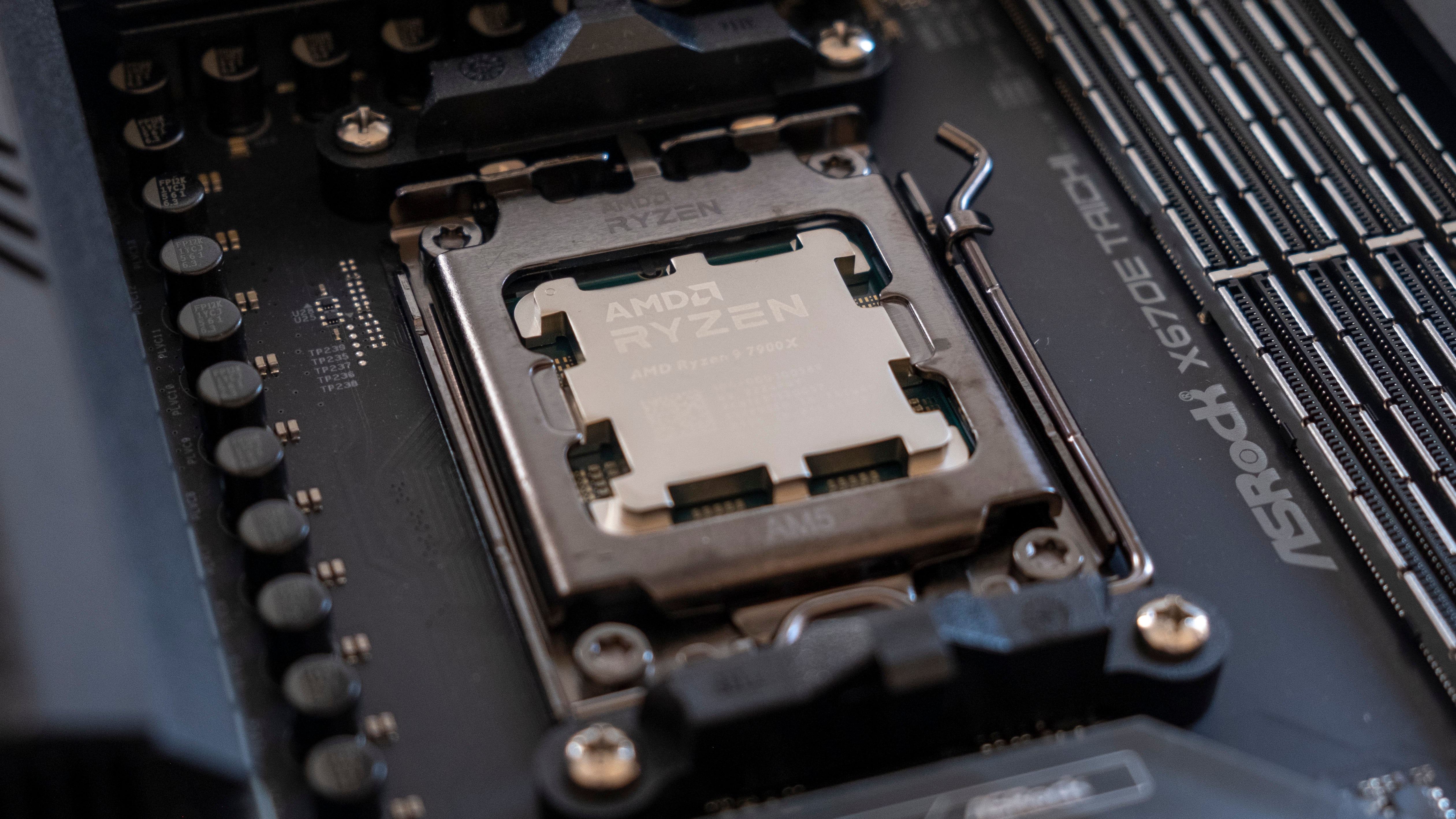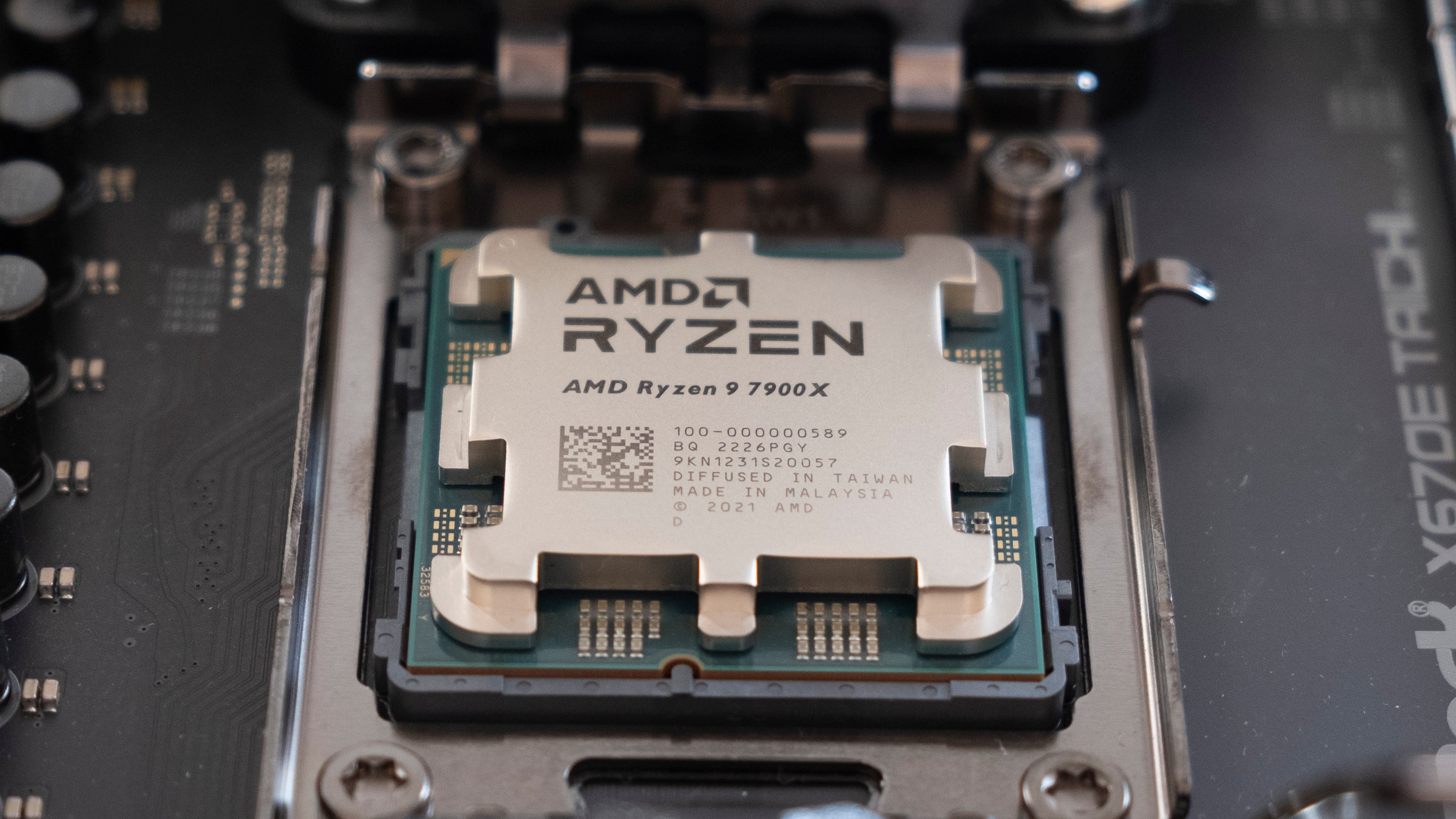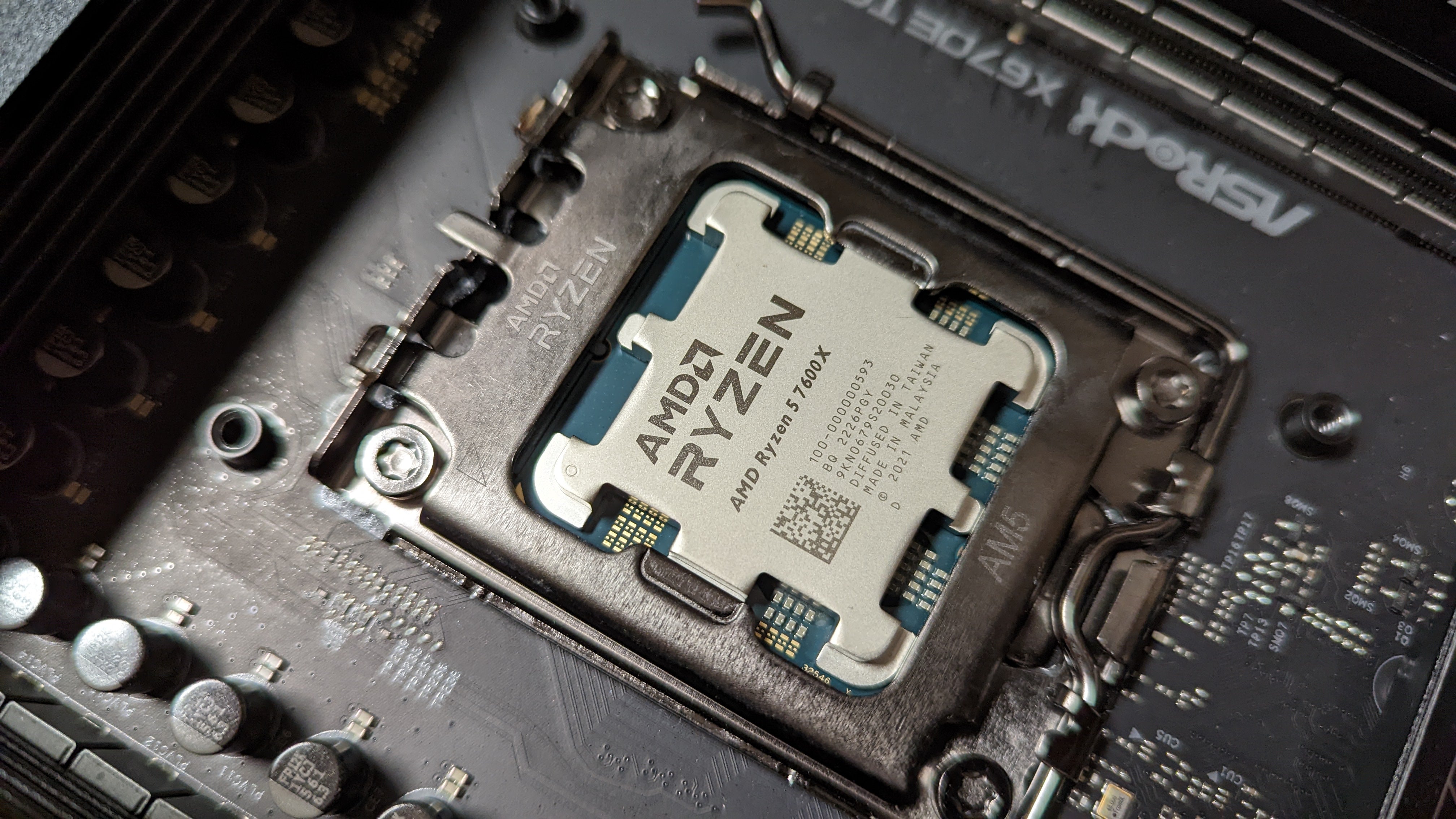Of course, features often come second to fps, so performance testing has comprised the bulk of our efforts. So far, two chips have crossed our desks - the $549/£579 Ryzen 9 7900X and $299/£319 Ryzen 5 7600X - and we’ve put them up against our assortment of hand-picked games and a sprinkling of productivity benchmarks too. The question we want to answer is simple: how do these Zen 4 designs perform against Intel’s 12th-gen Core counterparts and AMD’s older Ryzen 5000 lineup?
The move to DDR5 also brings up a secondary question - what’s the current RAM sweet spot for price/performance with Ryzen 7000? AMD suggest in their documentation that DDR5-6000 is the ideal right now, so we’ve tested their CPUs - and Intel’s closest equivalents - at both 6000MT/s (AMD’s recommendation) and 5200MT/s (where we did our Intel 12th-gen testing).
Before we get into the results of our CPU benchmarks, let’s take a brief look under the hood to understand what AMD has wrought here.
First up, AMD recorded a 13 percent improvement to IPC, instructions per clock, thanks to a larger L2 cache, an improved execution engine, a better branch predictor and other internal changes. That should translate into a similar amount of single-core performance uplift at the same frequency, so combined with some substantial frequency improvements and the shift to higher-clocked DDR5, Ryzen 7000 ought to offer a better-than-average generational improvement.
The new AM5 platform is also fascinating. AMD has shifted from a ‘PGA’ to an ‘LGA’ design for their processors, meaning that instead of having gold pins on the underside of the CPU, these are now on the motherboard - so it’s now much harder to break a CPU, but easier to break a motherboard. The pin count has also risen substantially, allowing more power to be delivered to the CPU - up to 230W, with the Ryzen 9 designs moving from a default TDP of 105W last-gen to 170W this-gen.
That puts a greater focus on CPU cooling, but some existing AM4 CPU coolers should also work on AM5 which is nice for anyone that’s invested in a high-end option. Basically, any cooler that screwed into the default AMD AM4 backplate can also screw into the new AM5 one, but designs that required a custom backplate to be installed aren’t compatible. Thankfully, our test rig uses Alphacool’s Eisbaer Aurora 240mm AiO, which does use the default AMD backplate and therefore we can maintain cooler compatibility across the generations - nice.
It’s also worth bringing up the rest of the test rig we’re using. AMD provided ASRock’s X670E Taichi motherboard, which provides a plethora of M.2 slots, beefy power delivery and conveniences like on-board power and reset buttons, and an LED readout for error codes and current CPU temperature.
This is combined with high-spec G.Skill’s Trident Z5 Neo DDR5-6000 CL30 RAM, Corsair’s Dominator Platinum DDR5-5200 CL40 for supplementary testing and of course Asus’ RTX 3090 ROG Strix OC for the all-important GPU side of things. For storage, we’re using three PCIe 4.0 NVMe SSDs to hold all of our games - a 4TB Kingston KC3000, a 1TB PNY XLR8 CS3140 and a 1TB Crucial P5 Plus. Our rig was completed with a 1000W Corsair RM1000x power supply.
Elsewhere, we used an Asus ROG Crosshair 8 Hero for Ryzen 5000 testing, an Asus ROG Maximus Z590 Hero for 11th-gen Intel testing and an Asus ROG Z690 Maximus Hero for 12th-gen testing; all of these are high-end boards for their respective platforms. DDR4 motherboards used G.Skill 3600MT/s CL16 memory, the sweetspot for DDR4.
Before we get into the gaming benchmarks that make up pages two to five, let’s whet our appetite with some quick and dirty content creation benchmarks: a Cinebench R20 3D render and a Handbrake video transcode.
As with the past two Ryzen generations, we do get a nice performance uplift in productivity that also spells out the maximum gains we could expect to see in gaming. There’s a healthy 25 percent jump in single-core speeds from the 5600X to the 7600X, as measured by Cinebench R20, and we see a similar margin at the top-end too. Impressively, that boost allows the 7900X to outperform the 5950X in the multi-threaded Cinebench test despite having four fewer cores and eight fewer threads; the 7950X ought to be an absolute titan. Moving over to the Handbrake transcode results, and the 7900X is 13 percent faster than the 5950X when it comes to H.264 encoding and just a tad shy of that for H.265. The 7600X, for its part, outperforms the 5800X and 5800X3D with an average transcode framerate of 20fps, compared to ~19 for the last-gen Ryzen 7 parts.
Power usage, measured at the wall for a quick comparison, is increased for Ryzen 7000 compared to its predecessor - but it’s quite modest, truth be told. The new 6900X + X670E system drew 288W at its maximum, compared to 237W for the 5950X + X570 - a 21 percent increase that is more or less in-line with the increased speeds we’re getting here. It’ll be interesting to see whether mammoth coolers and additional power unlock any meaningful performance gains; on Ryzen 5000 the chip seemed to offer full utilisation out of the box but a shift to a new socket, higher power targets and so on could mean there’s some overclocking headroom to discover.
With those out of the way, let’s move onto the fun stuff: checking out how the 7600X and 7900X perform in a range of games. Click the quick links below to move onto the titles you’re most interested in, or hit the ’next page’ button to take it all in!
AMD Ryzen 9 7900X and Ryzen 5 7600X analysis
Introduction, test rig and content creation benchmarks [This Page] Gaming benchmarks: Flight Simulator 2020, Hitman 3 Gaming benchmarks: Counter-Strike: GO, Metro Exodus EE, Black Ops Cold War Gaming benchmarks: Cyberpunk 2077, Far Cry 6, Crysis 3 Remastered Gaming benchmarks: Memory bandwidth analysis AMD Ryzen 9 7900X and Ryzen 5 7600X: the Digital Foundry verdict




